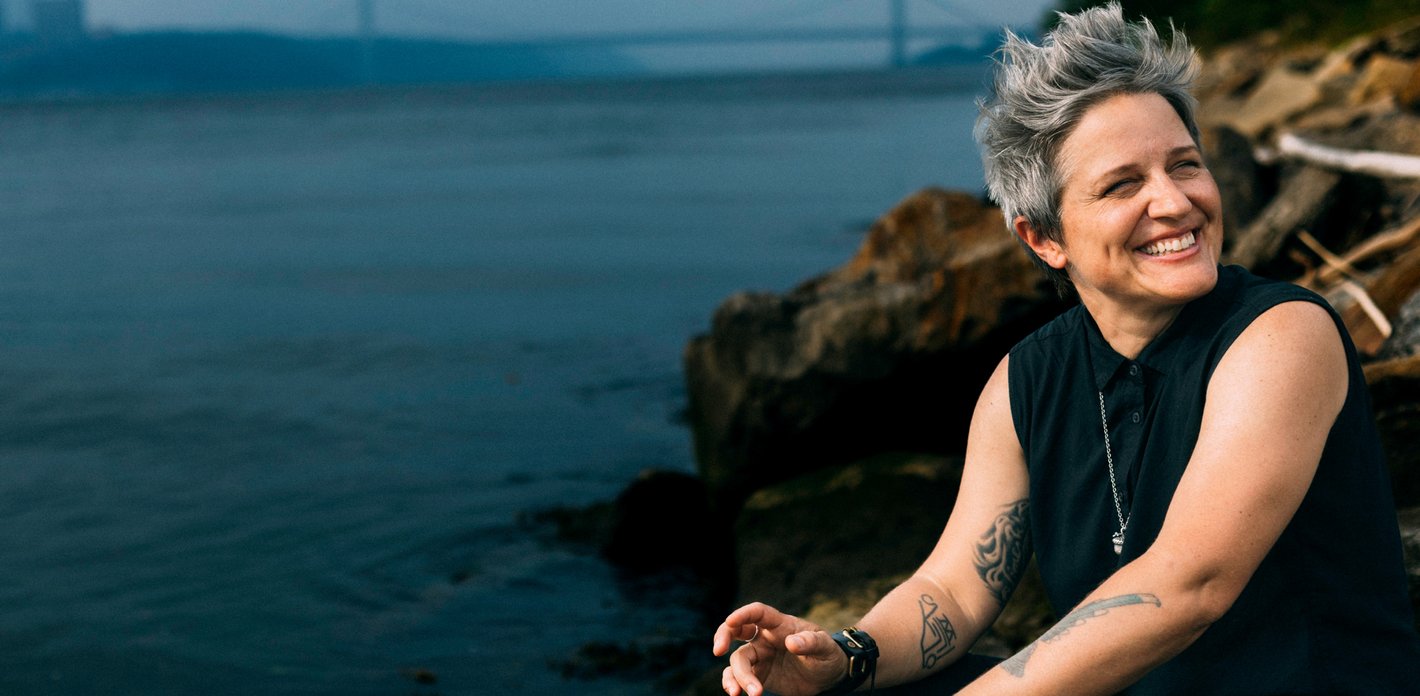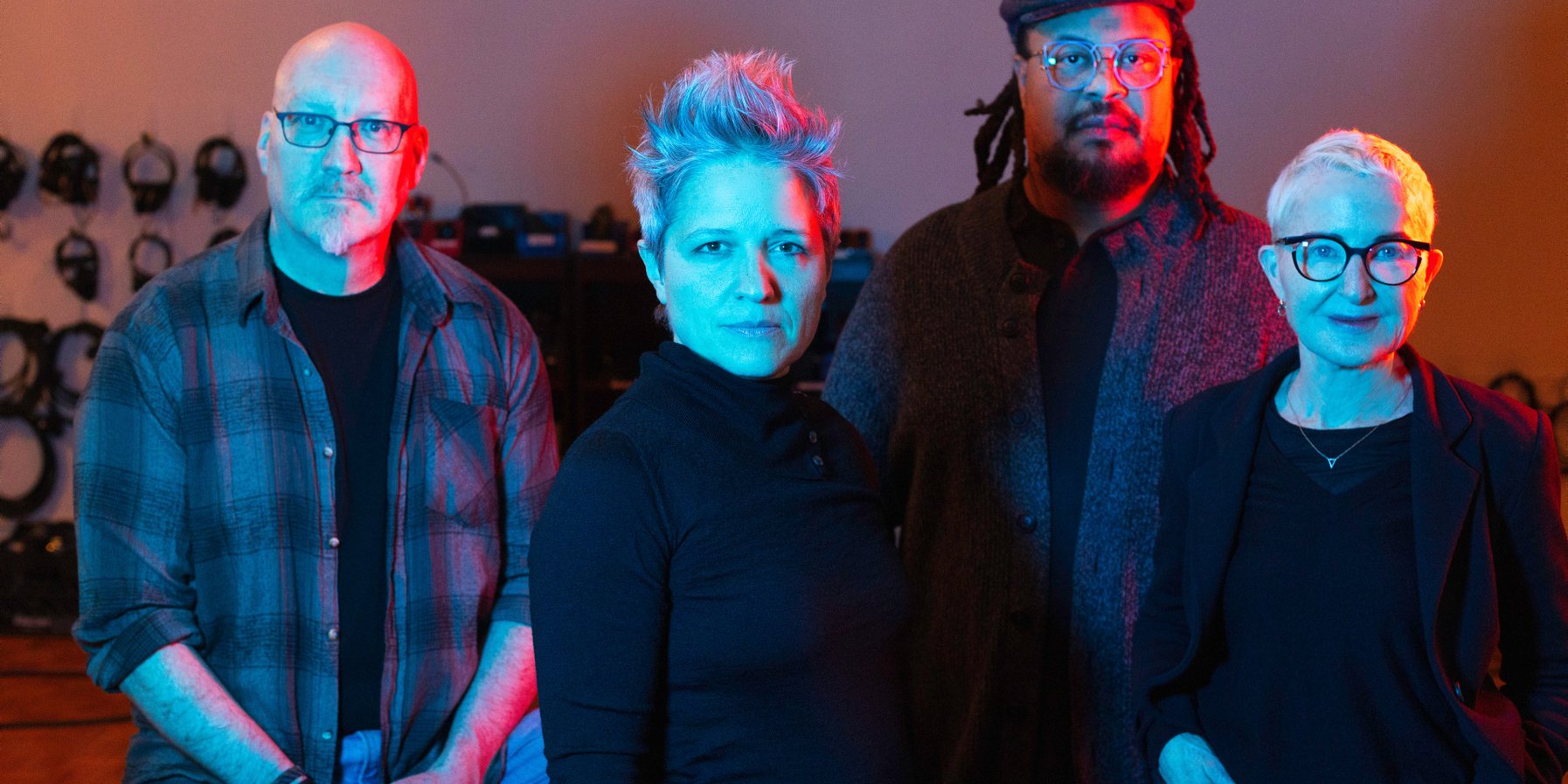By Tom R. Schulz, 01.01.2025
English translation: Clive Williams
Allison Miller is a highly gifted drummer. She has followed the call of the drum from an early age, unwaveringly and, by all accounts, happily for the most part. She never wanted to be anything but a drummer, she enjoyed wise and cautious support from her family and managed to cope with the adversities that face women in jazz - at least as soon as we’re not talking about male projections, but about a female jazz artist, and a drummer to boot.
Miller provides the bands she plays in with a sparkling and resilient net woven from clever, effortlessly flowing grooves, a net that the other players can improvise on freely. Her history and the way she manages to be herself in the male world of jazz also enlivens today’s gender debates. So let’s start with Adam and Eve and the unfortunate division of the post-Paradise story of human dominance into matriarchy and patriarchy.
»When the Drummers were women«
It is said that there was plenty of everything in the Garden of Eden, but too few details from Paradise have been handed down for us to know whether the first human couple sometimes enjoyed their dolce far niente to the accompaniment of drums. In keeping with the way men see themselves, there is no doubt that if there had been a primordial drum in paradise, it would have been beaten by Adam, not Eve. It certainly wouldn’t have occurred to a painter in earlier times to place this archaic instrument in the hands of a woman. He might have shown her dancing to Adam’s primal beats. But the masters of creation certainly did’t intend her to be producing the drumbeats herself. And, let’s be honest, it still isn’t in History in many cases.
Herstory is different, of course. In her standard feminist music work »When the Drummers Were Women« (1997), the great frame drummer Layne Redmond from the USA tells of how the frame drum, held by hand and sometimes beaten with the hands, sometimes with a mallet, was played by women in pre-Christian cultures, and only by women – priestesses, shamans, healers. Moses’s sister Miriam used it to lead the dance of joy after the successful flight from Egypt. It is highly plausible that men also enjoyed the warm sound of the drum when women’s hands worked on it. Deep down, a drumbeat is nothing other than an external expression of the human heartbeat. And both male and female foetuses hear this in their mother’s womb. The primal experience of rhythm is female.

Allison Miller can certainly conjure up fine rhythms and sounds on the frame drum, but she usually plays a classic jazz drumset. After all, we live in the 21st century, where the sight of a woman with drumsticks behind what coarser men like to call a shooting gallery is still the exception, but not quite as rare as it was twenty or thirty years ago. In Miller’s case, the term »playing the drums« is an accurate description, because this drummer really plays her instrument. Nothing she does looks like work. Typical of women in male professions, they have to perform better than a guy, but they mustn’t let a man notice, no way! Allison Miller, this petite person with the tousled haircut of the eternal punk, seems to be blissfully lost to the world as she plays, yet she plays with all the finesse at her disposal. She always spreads joy, no matter how complex and intricate the music she is playing.
If you look closely, you’ll notice her rather old-fashioned hand position. On the left, the drumstick is not a straight extension of the forearm into the fist, but lies crosswise, so that the sticks on the left and right don’t hit the drumskin at the same time in a drum roll. This position is reminiscent of the old military drumming and jazz school à la Gene Krupa or Buddy Rich. Allison Miller learnt from Walter Salb in Washington, one of many unknown but important teachers who pass on their skills and knowledge without ever having had their own stage career to speak of.

cowboy shirts, cowboy boots
For two years, at her parents’ behest, Miller only practised at home on a plastic-covered pad, which sounds about as exciting as hitting a sack of rice, except that the sticks bounce back better from the pad. Miller kept at it and soon got so good that the unrewarding practice set gave way to a real drum kit. The idol of her youth was Tony Williams, drummer with the Miles Davis Quintet in the sixties. Williams was a genius on the drums: intense and unfathomably deep, he drove the music before him on mighty wings. An archangel of jazz, no less.
Allison Miller says in a video that she comes from Texas, which is perhaps why she likes cowboy shirts and cowboy boots. She grew up near Washington DC on a farm, where she milked the goats in the morning before school. She dresses in a style that the American feminist scene calls dapperQ, with the Q standing for queer. Straight cuts, functional, a rather masculine look. In a story for the Huffington Post years ago, Miller wrote about how strange she felt in her early days as a lesbian drummer. How for years she was always at the forefront of the sexist banter with the guys on the tour bus, until all these nasty little moments of self-denial piled up in front of her and then she stood up for herself and stood up to them. And she was surprised at how positively many of her fellow musicians responded. (Those who didn’t simply deleted her from their address book.)
Today, Allison Miller lives the free, complicated life of a self-confessed feminist who plays jazz full-time all over the world, composes, teaches, produces recordings for others and is raising two children on her own after a relationship broke up. Looking at her circumstances and how easily she has settled into them, it seems fair to say that a little social progress has been made in the last 25 years.
jazz as the music of freedom
The title of the debut album of the band that Allison Miller is appearing with as part of the Elbphilharmonie jazz percussion spotlight is »Tomorrowland«. This tomorrowland has the nature of a promise: two women, bandleader Allison Miller and pianist Myra Melford, play in the Lux Quartet’s regular line-up with two men, bassist Scott Colley and saxophonist Dayna Stephens. Together they produce music that oscillates between an appointment and spontaneity in a manner at once magnificent and casual. Inside and outside playing, as jazz musicians call it, balance each other out. The outside playing is never arbitrary or cacophonous, but ranges from subtle to ecstatic. The ears of the four participants are always involved. The inside playing also remains unconventional, inspired and full of surprises. All four musicians compose as well.
You can hear this energetic, yet relaxed and soulful music as a contemporary commentary on the utopia that jazz has always championed: balance among the earth’s inhabitants, respect for all. The jazz that the Lux Quartet performs is the living dream of a world in which skin colour and sexual orientation no longer play a role, because they no longer subject anyone to reprisals. A world where all genders and generations are equal; where discord is celebrated for a long time even in its unresolved state, and freedom is always the freedom of people who play differently; in which the unrepeatability of the moment ultimately becomes the altar on which creative egos go up in collective, sweet smoke for the sake of togetherness.
This article appeared in the Elbphilharmonie magazine (Issue 1/25).
- Elbphilharmonie Kleiner Saal
Allison Miller & Myra Melford’s Lux Quartet
»Tomorrowland« – Jazz Drums
Past Concert







